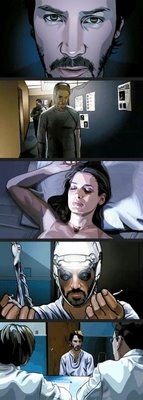Linklater y el "culto" del cine y la pega del director

FC: In your case you found or lost yourself by joining the cult of cinema?
RL: Yeah, the cult of art in general, and cinema would be the subculture within that. I always felt cinema was a parallel life that I preferred to the real world, It probably goes back to something as childlike as sitting in a movie theater and forgetting yourself completely as you watch this dream on the big screen. Obviously, that is why film has always been so successful.
It´s a physical manifestation of what we all do every night, which is to dream.
FC: And film infiltrates your nervous system. Watching a movie is an experience that lives on within you afterwards.
R.L.: It´s still in you in a similar way a personal memory would be. Some of your most intense emotions or experiences come through secondary sources. For me, it was intense moments watching movies. Not that my life is devoid of intense moments, I have plenty of them, but some of the most profound, because they´re so perfectly clean, because you´re not directly, are in films. When it´s your own life, you have so much baggage attached. But there´s something clean about a moment in cinema that you´re purely moved by.

FC: How would you define the director’s job?
R:L: For me it’s different on different movies. I mean, it’s your taste, the vibe you lay down the visual and the working rules, that you lay down for everyone that you’re working with. So I think you set a tone for everything. Even if I’ve written it, once I’m directing it, my job is to make the film work, and I don’t care who wrote it, whether it was me or someone else. I’m more collaborating with the actor than the writer at that point. I’m trying to make it come to life in some way. You’re trying to bring something to life along the way and tell the story you’ve set out to tell, so whatever it takes. And a lot of it’s who you’re collaborating with, what department heads, what creative people you’re working with. I love it, because it hits on everything. As a younger person, I think I wanted to be a writer. That seemed to me my only area I could express myself in. I didn’t know other mediums were even open to me. But once I realized I was a filmmaker and had films in my head, I realized that was so my calling because it answered the need in me to work with others, to collaborate. When I was young, I was kind of left on my own, and just reading. I’m pretty solitary. Film got me actively engaged with others in a collaborative, creative way. That’s what I find probably the most rewarding, the collaboration aspect. It’s perhaps one-sided, because I kind of have veto power and ultimate say, so there’s a certain amount of dictatorial power in the structure, but I think within that structure you can make it work in a lot of different ways.

F.C.: The impulse to build a community around yourself was evident even before you made films—you and a few others created the Austin Film Society out of nothing.
R.L.: It was that alternate life where you can kind of remake your adult life different from your childhood life; you can remake it in an artistic way with likeminded people who share the same passions. In this case, it was cinema life. What joined us was the love of film, rather than blood relatives. Your friends are the family you pick. It was always at the behest of something greater, which was film. If I hadn’t been a director, I think I’d have a theater or I’d be doing something film-related for sure. I could gather the troops and use whatever leadership skills I could muster and get over whatever shyness I had for that cause. I couldn’t do it for something that dealt with just me.


<< Home